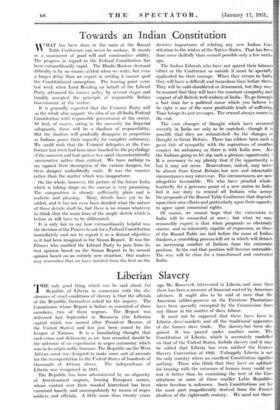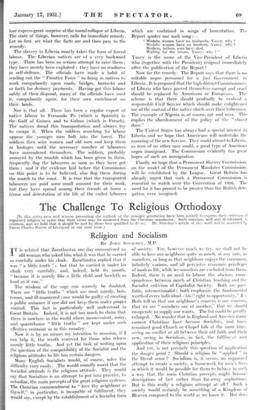Liberian Slavery
IlHE only good thing which can be said about the . Republic of Liberia in connexion with the dis- closures of cruel conditions of slavery is that the officials of the Republic themselves asked for the inquiry. The Commission whose Report is before .us consisted of three members, two of them negroes. . The Report was delivered last September in Monrovia (the Liberian capital which was named after President Monroe, of the United States) and has just been issued by the League of Nations. It is a humiliating thought that such crime and dishonesty as are here recorded should be the outcome of an experiment in negro autonomy which was in its origin nobly humane. The Republic on the West African coast was designed to make some sort of amends for the transportation to the United States of hundreds of thousands of African slaves. The independence of Liberia was recognised in 1847.
The Republic has been administered by an oligarchy of Americanized negroes, bearing European names, whose control, over their wooded hinterland has been exercised loosely and unscrupulously by means of negro soldiers and officials. A little more than twenty years ago Mr. Roosevelt intervened in Liberia, and since then there has been a measure of financial control by American advisers. It ought also to be said at once that the American rubber-growers on the Firestone Plantations have been specially exempted by the Commission from any blame in the matter of slave labour.
It must not be supposed that there have been in Liberia slave-markets and all the traditional apparatus of the former slave trade. The slavery has been dis- guised. It has passed under another name. • The Constitution of Liberia,- which is accurately modelled on that of the United States, forbids slavery and it may be added that Liberia has even ratified the Geneva Slavery Convention of 1926. Unhappily Liberia is not the only country where an excellent Constitution signifies nothing. Those who. think that they have an aptitude for bearing with the extremes of human irony could not test it better than by examining the text of the Con- stitutions in some of those smaller Latin Republics where freedom is unknown. - Such Constitutions are for the most part magnificently derived from the -French idealism of the eighteenth- century: We need not there- fore express great surprise at the moral collapse of Liberia. The state of things, however, calls for immediate remedy. Let us first see what the facts are and then pass to the remedy.
. The slavery in Liberia mostly takes the form of forced • labour. The Liberian natives are of a very backward type. There has been no serious attempt to raise them ; they have merely been exploited ; they have no readiness in -self-defence. The officials have made a habit of .sending out the "Frontier Force" to bring in natives to work • compulsorily upon roads, bridges, barracks and .so forth for derisory payments. Having got this labour safely at their disposal, many of the officials have used -it, compulsorily again, for their own enrichment on their lands.
Nor is that all. There has been a regular export of native labour to Fernando To (which is Spanish) in the Gulf of Guinea and to Gabun (which is French). The natives dread this transportation and always try to escape it. When the soldiers searching for labour appear the younger men bolt into the forest. The scildiers then seize women and old -men and keep them as hostages until the necessary number of labourers have surrendered themselves. The soldiers, probably annoyed by the trouble which has been given to them, frequently flog the labourers as soon as they have got them and if the evidence laid before the Commission on this paint is to be believed, also flog them during the march to the coast. It is trite that the transported labourers are paid some small amount for their work, but they have spread among their friends at home a terror and detestation of the life of the exiled labourer which are enshrined in songs of lamentation. The Report quotes one such song :— " Wedabo women have no husbands, Yaney, why ? Wedabo women have no brothers, Yancy, why ? Mothers, fathers, sons have died,
Waiting for the return, Yancy, why ? "
Yaney is the name of the Vice-President of Liberia who (together with the President) resigned immediately after the publication of the Report !
Now for the remedy. The Report says that there is no suitable negro personnel for a just Government in Liberia. It is proposed that the high district Commissioners of Liberia who have proved themselves corrupt and cruel should be replaced by Americans or Europeans. The scheme is that there should gradually be evolved a responsible Civil Service which should make enlightened use of the control of the native chiefs over their tribesmen. The example of Nigeria is, of course, apt and near. This implies the abandonment of the policy of the " dosed door."
The United States has always had a special interest in Liberia, and we hope that Americans will undertake the manning of the new Service. They could attract to Liberia, as men of no other race could, a good type of American negro immigrant. The Commission evidently has great hopes of such an immigration.
Finally we hope that a Permanent Slavery Commission, on the model of the Permanent Mandates Commission, will be established by the League. Great Britain has already urged that such a Permanent Commission is essential to watch over the Convention of 1926. The need for it has proved to be greater than the British dele- gation ever imagined.





































 Previous page
Previous page